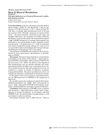 7 citations,
January 2022 in “Plants”
7 citations,
January 2022 in “Plants” Rice husk and bran extracts from the Bue Bang 3 CMU variety can potentially treat hair loss due to their antioxidant, anti-inflammatory, and anti-androgenic properties.
 5 citations,
May 2023 in “Frontiers in immunology”
5 citations,
May 2023 in “Frontiers in immunology” Environmental factors like diet and vitamin levels, especially Vitamin D, can affect autoimmune diseases differently, with lifestyle changes potentially improving outcomes.
4 citations,
December 2021 in “Pharmacological Reports” Metformin is less effective in men with early-onset hair loss.
 4 citations,
January 2020 in “Frontiers in Physiology”
4 citations,
January 2020 in “Frontiers in Physiology” Good feather growth in poultry needs the right balance of proteins, amino acids, minerals, and vitamins.
 3 citations,
February 2020 in “International journal of women’s dermatology”
3 citations,
February 2020 in “International journal of women’s dermatology” Most women with hair loss take more supplements than average, but these often don't help and can be risky and costly.
 3 citations,
April 2022 in “Clinical, Cosmetic and Investigational Dermatology”
3 citations,
April 2022 in “Clinical, Cosmetic and Investigational Dermatology” Different methods, including stress management, healthy diet, supplements, and treatments like minoxidil, can help hair grow back after COVID-19 related hair loss.
 2 citations,
June 2016 in “Journal of skin and stem cell”
2 citations,
June 2016 in “Journal of skin and stem cell” Wet cupping blood has different components than regular venous blood, which might affect skin disorder treatments.
 January 2023 in “Voennaâ medicina”
January 2023 in “Voennaâ medicina” Hair loss in women can improve with iron and vitamin supplements if caused by iron deficiency.
 January 2022 in “IntechOpen eBooks”
January 2022 in “IntechOpen eBooks” Some lesser-known causes of PCOS include autoimmune issues, genetic mutations, and changes in the body's microbiome.

Microneedle technology is effective for skin rejuvenation and enhancing cosmeceutical delivery, with ongoing innovation and increasing commercialization.
 November 2016 in “Zoo biology”
November 2016 in “Zoo biology” Adding more vegetables and fruits improved capybaras' coat quality and health.
 January 2024 in “Apple Academic Press eBooks”
January 2024 in “Apple Academic Press eBooks” Vitamins might not effectively treat hair loss and can sometimes be harmful.
 December 2017 in “Journal of Cosmetic Dermatology”
December 2017 in “Journal of Cosmetic Dermatology” Researchers found certain genes are overactive and others are underactive in men with early balding, which could help create new treatments.
 February 2022 in “Scientia Pharmaceutica”
February 2022 in “Scientia Pharmaceutica” Different hair loss treatment ingredients work well with TrichoTech™ vehicles for 3 to 6 months, making them good for use in hair treatments.
 41 citations,
June 2016 in “Reviews in endocrine and metabolic disorders”
41 citations,
June 2016 in “Reviews in endocrine and metabolic disorders” Hidradenitis suppurativa may be related to hormones and patients often have metabolic disorders; more research is needed to understand this connection.
 40 citations,
April 2013 in “Dermato-endocrinology”
40 citations,
April 2013 in “Dermato-endocrinology” People with chronic Alopecia Areata often have lower vitamin D levels.
 10 citations,
March 2015 in “American journal of primatology”
10 citations,
March 2015 in “American journal of primatology” Ingesting Leucaena leucocephala caused hair loss and increased infant mortality in ringtailed lemurs.
 8 citations,
March 2018 in “Expert Review of Respiratory Medicine”
8 citations,
March 2018 in “Expert Review of Respiratory Medicine” Inhalation therapy may repair and protect elastin in the lungs of COPD patients.
 7 citations,
January 2017 in “Journal of cosmetology & trichology”
7 citations,
January 2017 in “Journal of cosmetology & trichology” Good nutrition is crucial for healthy hair and can help with hair loss without medication.
 3 citations,
January 2000
3 citations,
January 2000 Some alternative therapies for vitiligo show promise but need more research.
 2 citations,
July 2018 in “Elsevier eBooks”
2 citations,
July 2018 in “Elsevier eBooks” Some supplements may help with hair loss, but there's not enough strong evidence to recommend them without doctor advice.
February 2024 in “IntechOpen eBooks” Proper nutrition can help manage PCOS symptoms and improve overall health.
 November 2022 in “Journal of the Endocrine Society”
November 2022 in “Journal of the Endocrine Society” Estrogen deficiency can reduce the enzyme activity needed to activate vitamin D.
 October 2011 in “Dermato-endocrinology”
October 2011 in “Dermato-endocrinology” Hormones significantly affect skin health, with vitamin D playing a key role.
 May 2024 in “Journal of cosmetic dermatology”
May 2024 in “Journal of cosmetic dermatology” Low HDL-C, uric acid, and 25-hydroxyvitamin D are risk factors for early-onset male hair loss.
 May 2023 in “Elsevier eBooks”
May 2023 in “Elsevier eBooks” Some nutritional supplements may help thicken hair in people with hair loss, but taking too much can cause side effects.
110 citations,
November 1984 in “The American Journal of Medicine” A genetic defect in vitamin D receptors causes severe rickets and hair loss in children, but some heal as they age.
54 citations,
September 2012 in “The journal of investigative dermatology/Journal of investigative dermatology” Vitamin A affects hair loss and immune response in alopecia areata.
 8 citations,
September 2021 in “Journal of Cosmetic Dermatology”
8 citations,
September 2021 in “Journal of Cosmetic Dermatology” Some diets and supplements might help with skin disorders, but their effectiveness varies and more research is needed.
 4 citations,
March 2006 in “Journal of renal nutrition”
4 citations,
March 2006 in “Journal of renal nutrition” Dialysis patients benefit from water-soluble vitamins but need careful management to avoid risks.

























